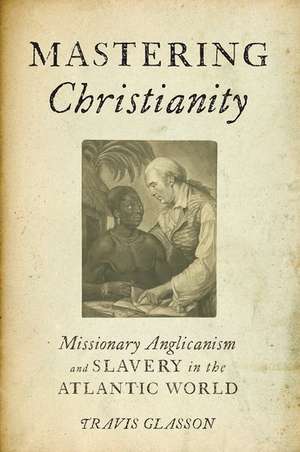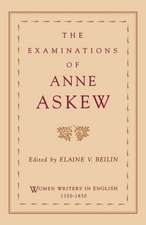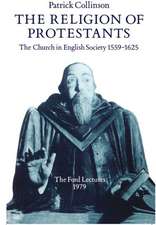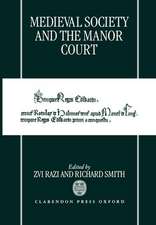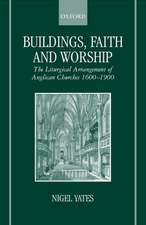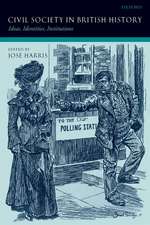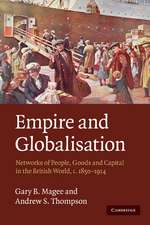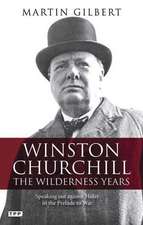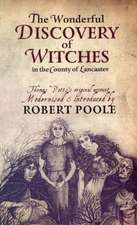Mastering Christianity: Missionary Anglicanism and Slavery in the Atlantic World
Autor Travis Glassonen Limba Engleză Paperback – 14 sep 2017
| Toate formatele și edițiile | Preț | Express |
|---|---|---|
| Paperback (1) | 227.50 lei 31-37 zile | |
| Oxford University Press – 14 sep 2017 | 227.50 lei 31-37 zile | |
| Hardback (1) | 581.72 lei 31-37 zile | |
| Oxford University Press – 8 dec 2011 | 581.72 lei 31-37 zile |
Preț: 227.50 lei
Preț vechi: 255.08 lei
-11% Nou
Puncte Express: 341
Preț estimativ în valută:
43.54€ • 47.28$ • 36.57£
43.54€ • 47.28$ • 36.57£
Carte tipărită la comandă
Livrare economică 12-18 aprilie
Preluare comenzi: 021 569.72.76
Specificații
ISBN-13: 9780190683016
ISBN-10: 0190683015
Pagini: 330
Ilustrații: 15 halftones
Dimensiuni: 157 x 231 x 20 mm
Greutate: 0.48 kg
Editura: Oxford University Press
Colecția OUP USA
Locul publicării:New York, United States
ISBN-10: 0190683015
Pagini: 330
Ilustrații: 15 halftones
Dimensiuni: 157 x 231 x 20 mm
Greutate: 0.48 kg
Editura: Oxford University Press
Colecția OUP USA
Locul publicării:New York, United States
Recenzii
While the book is constructed largely as a study of the eighteenth-century Atlantic World, religion, race, and the institution of slavery, it also has broader importance to the study of the often surprisingly complex and multifaceted world of imperial and colonial society where religion functioned with a motivational power only misleadingly reduced to material or social forces. Nevertheless, Glasson also impressively demonstrates the degree to which economic, worldly realities forged the environment of empire and influenced religious beliefs, often in ways that contradicted and corroded Christian ethical precept, and in the eighteenth century, reinforced the emergence of new racial hierarchies while providing support for the institution of slavery.
This important book by Travis Glasson extends and deepens our understanding of the earliest English Protestant missionary society, the Society for the Propagation of the Gospel. ... To read Glasson's book is to glimpse an age when Anglicans sought to forge a new, expansive imperial identity, but also struggled to square their commitment to maintaining social order with supporting the radical Christian notion of the equality of souls. ... Mastering Christianity represents an important addition to our knowledge of the spread of multiple, competitive forms of Christianity in the developing British imperial framework. With a sure command of the historiography and sources, Glasson's careful scholarship has produced the first full history of one of the most important institutional forces in the British Empire in the eighteenth century in its relationship to slavery.
Mastering Christianity is a welcome addition to the burgeoning historical literature on slavery and the Atlantic world. ... [It] provides a rich if sobering introduction to how a Christian organization dedicated to the salvation of 'heathen' servants became a servant to the status quo, supporting slavery and its perpetual extension. ... His book provides a compelling explanation for that wavering trajectory.
Travis Glasson's marvelous new study of the SPG's operations among African slave populations in the eighteenth- and early-nineteenth-century Atlantic world is such a welcome addition to our understanding of the dynamics of imperial Christianity. Deeply researched and thoroughly engaging Glasson's thesis is an original and compelling one.
Over the years the tangled story of the changing relationship of the Anglican Church with the institution of slavery between the late seventeenth century and the eventual ending of that institution by the British in 1838 has received its fair share of scholarly attention. This ambitious study fully succeeds in its objective of casting the Society for the Propagation of the Gospel in Foreign Parts, its activities and shifting perceptions of slavery and African peoples, in an entirely fresh light. It is scholarship of the very highest quality, of immense intellectual power and authority, and promises to stand as the definitive study for many years to come.
At last we have a history of the Anglican missions that appreciates the scale and impact of their religious enterprise. Mastering Christianity provides the best analysis yet of the Society for the Propagation of the Gospel, a crucial instrument in the cultivation of a British Atlantic world made possible by enslaved laborers. By closely examining the entanglement of Anglicanism and slavery, rather than skipping forward to the evangelical revivals, Glasson offers fresh insight into why so many black people joined the Church of England
Travis Glasson's pioneering and revisionist Mastering Christianity reconstructs the always vexed and increasingly corrosive relationship between the evangelical agenda of the Society for the Propagation of the Gospel in Foreign Parts and the reality of its economic and ideological involvement with black chattel slavery. Mastering Christianity is a significant contribution to studies of race, religion, slavery, and abolition in the British circum-Atlantic empire.
Travis Glasson has written the definitive history of the Society for the Propagation of the Gospel's evangelization mission to enslaved Africans and their descendants in the British Atlantic World. Brilliantly conceived and exhaustively researched, Mastering Christianity explores the intellectual and practical evolutions of the SPG mission from the dawn of the eighteenth century to the abolition of British West Indian slavery in 1838. Glasson's readable prose yields fresh insights about the work of Anglican missionaries, the people they sought to convert, and the impact these missions had upon the struggles over Atlantic slavery's future.
Mastering Christianity is an important reconsideration of the intersection of religion, race and slavery in the eighteenth-century Atlantic. Like few others, Glasson takes us inside the complex world of missions to enslaved people and of Christianity's complicity in slavery and racial hierarchies.
We can be very grateful to Travis Glasson for showing us what can happen when we turn our voices from the service of our Lord to the service of our own corps and ourselves.
Glasson's excellent new book repositions the eighteenth-century Church of England as a critical imperial institution with an Atlantic reach…[and] its struggles to engage and convert enslaved and native people while also sustaining its relationship with the Atlantic planter class."-Rebecca A. Goetz, Journal of Religion
“Mastering Christianity examines why Anglican authorities came (belatedly) to the missionary impulse, how they sought to put this desire into practice, and why they proved so ineffectual, at least in regard to the conversion of the Africans who lived under British rule. This is a fascinating, if also somewhat depressing, study of an institution whose religious and moral principles, and potential for doing good, were fatally compromised by its social and political ties and ambitions.”-Robert Olwell, American Historical Review
Mastering Christianity presents a deeply informative account of contemporary beliefs and activities; it is both rigorously researched and clearly (and dispassionately) argued. Broadly speaking, it adds perspective to how Anglicanism has struggled to adapt to historical change, and one suspects that the stalwarts of the SPG would be surprised by the Church's modern demographics.
In this richly detailed study the author sets out to revise the conventional wisdom about Anglican humanitarianism...and to explain Anglicanism's failure to draw into its fold the black peoples who were the focus of its missionary efforts....The book succeeds....Highly useful and is likely to stand as the definitive work on the subject for years to come.
An important contribution to the literature on the intersection of race and religion in the Atlantic world.
The book's strength is in engaging with the questions of SPG intellectual contributions to growing racial awareness, and in recognizing and giving a place to the agency of non-Europeans who both resisted and adopted missionary Anglicanism in the eighteenth century....An unquestionably important intervention into the literature on missionary humanitarianism and the missionary relationship with slavery and abolition.
Glasson's excellent study reveals how devout men came to put profits and the perspective of slave masters ahead of concern for the souls and the bodies of the enslaved people it might have helped.
This important book by Travis Glasson extends and deepens our understanding of the earliest English Protestant missionary society, the Society for the Propagation of the Gospel. ... To read Glasson's book is to glimpse an age when Anglicans sought to forge a new, expansive imperial identity, but also struggled to square their commitment to maintaining social order with supporting the radical Christian notion of the equality of souls. ... Mastering Christianity represents an important addition to our knowledge of the spread of multiple, competitive forms of Christianity in the developing British imperial framework. With a sure command of the historiography and sources, Glasson's careful scholarship has produced the first full history of one of the most important institutional forces in the British Empire in the eighteenth century in its relationship to slavery.
Mastering Christianity is a welcome addition to the burgeoning historical literature on slavery and the Atlantic world. ... [It] provides a rich if sobering introduction to how a Christian organization dedicated to the salvation of 'heathen' servants became a servant to the status quo, supporting slavery and its perpetual extension. ... His book provides a compelling explanation for that wavering trajectory.
Travis Glasson's marvelous new study of the SPG's operations among African slave populations in the eighteenth- and early-nineteenth-century Atlantic world is such a welcome addition to our understanding of the dynamics of imperial Christianity. Deeply researched and thoroughly engaging Glasson's thesis is an original and compelling one.
Over the years the tangled story of the changing relationship of the Anglican Church with the institution of slavery between the late seventeenth century and the eventual ending of that institution by the British in 1838 has received its fair share of scholarly attention. This ambitious study fully succeeds in its objective of casting the Society for the Propagation of the Gospel in Foreign Parts, its activities and shifting perceptions of slavery and African peoples, in an entirely fresh light. It is scholarship of the very highest quality, of immense intellectual power and authority, and promises to stand as the definitive study for many years to come.
At last we have a history of the Anglican missions that appreciates the scale and impact of their religious enterprise. Mastering Christianity provides the best analysis yet of the Society for the Propagation of the Gospel, a crucial instrument in the cultivation of a British Atlantic world made possible by enslaved laborers. By closely examining the entanglement of Anglicanism and slavery, rather than skipping forward to the evangelical revivals, Glasson offers fresh insight into why so many black people joined the Church of England
Travis Glasson's pioneering and revisionist Mastering Christianity reconstructs the always vexed and increasingly corrosive relationship between the evangelical agenda of the Society for the Propagation of the Gospel in Foreign Parts and the reality of its economic and ideological involvement with black chattel slavery. Mastering Christianity is a significant contribution to studies of race, religion, slavery, and abolition in the British circum-Atlantic empire.
Travis Glasson has written the definitive history of the Society for the Propagation of the Gospel's evangelization mission to enslaved Africans and their descendants in the British Atlantic World. Brilliantly conceived and exhaustively researched, Mastering Christianity explores the intellectual and practical evolutions of the SPG mission from the dawn of the eighteenth century to the abolition of British West Indian slavery in 1838. Glasson's readable prose yields fresh insights about the work of Anglican missionaries, the people they sought to convert, and the impact these missions had upon the struggles over Atlantic slavery's future.
Mastering Christianity is an important reconsideration of the intersection of religion, race and slavery in the eighteenth-century Atlantic. Like few others, Glasson takes us inside the complex world of missions to enslaved people and of Christianity's complicity in slavery and racial hierarchies.
We can be very grateful to Travis Glasson for showing us what can happen when we turn our voices from the service of our Lord to the service of our own corps and ourselves.
Glasson's excellent new book repositions the eighteenth-century Church of England as a critical imperial institution with an Atlantic reach…[and] its struggles to engage and convert enslaved and native people while also sustaining its relationship with the Atlantic planter class."-Rebecca A. Goetz, Journal of Religion
“Mastering Christianity examines why Anglican authorities came (belatedly) to the missionary impulse, how they sought to put this desire into practice, and why they proved so ineffectual, at least in regard to the conversion of the Africans who lived under British rule. This is a fascinating, if also somewhat depressing, study of an institution whose religious and moral principles, and potential for doing good, were fatally compromised by its social and political ties and ambitions.”-Robert Olwell, American Historical Review
Mastering Christianity presents a deeply informative account of contemporary beliefs and activities; it is both rigorously researched and clearly (and dispassionately) argued. Broadly speaking, it adds perspective to how Anglicanism has struggled to adapt to historical change, and one suspects that the stalwarts of the SPG would be surprised by the Church's modern demographics.
In this richly detailed study the author sets out to revise the conventional wisdom about Anglican humanitarianism...and to explain Anglicanism's failure to draw into its fold the black peoples who were the focus of its missionary efforts....The book succeeds....Highly useful and is likely to stand as the definitive work on the subject for years to come.
An important contribution to the literature on the intersection of race and religion in the Atlantic world.
The book's strength is in engaging with the questions of SPG intellectual contributions to growing racial awareness, and in recognizing and giving a place to the agency of non-Europeans who both resisted and adopted missionary Anglicanism in the eighteenth century....An unquestionably important intervention into the literature on missionary humanitarianism and the missionary relationship with slavery and abolition.
Glasson's excellent study reveals how devout men came to put profits and the perspective of slave masters ahead of concern for the souls and the bodies of the enslaved people it might have helped.
Notă biografică
Assistant Professor of History, Temple University
